<> Graphium antiphates (Cramer, [1775]) <>
the Fivebar Swordtail ผีเสื้อหางดาบใหญ่
Click on any photo to see all photos full size in Lightbox
Additions and corrections to the information provided on this page is always welcome. Please use the Contact form.
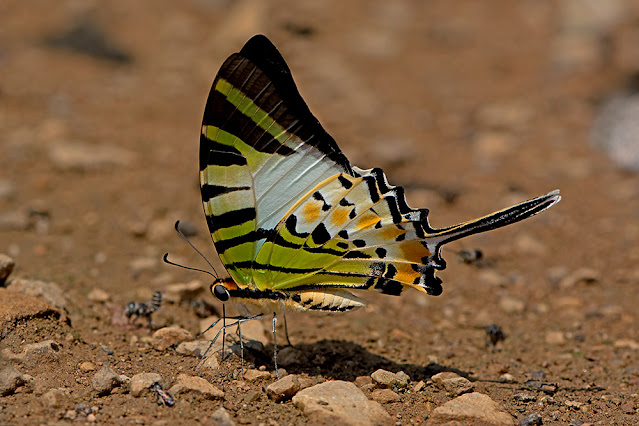
Photo taken at Doi Suthep-Pui National Park, Chiang Mai, Thailand. 450m a.s.l.

This attractive species is widely distributed throughout nearly all countries in the region from the Himalayas to the islands of Indonesia. The sexes look alike and they are strong and swift flyers. They sometimes visit flowers but are not habitual nectar feeders. The males are however avid mud puddlers and are seen regularly along the banks of streams. They quiver their wings constantly when they start feeding but once settled they keep their wings tightly closed.
Graphium antiphates is multivoltine with several broods per annum. The adult female lays her eggs singly on the upperside of young leaves on the host plant and can lay up to 50 eggs in total. The caterpillars possess an osmeterium (a fleshy forked organ) in the prothorax. Usually hidden, the greenish osmeterium can be everted rapidly and emits a foul-smelling secretion if the caterpillar is disturbed.
Synonyms and previously used names: Pathysa antiphates, Pathysa albescens, Papilio antiphates, Papilio nebulosus, Arisbe antiphates
Taxonomy: Animalia - Arthropoda - Insecta - Lepidoptera - Papilionidae - Papilioninae - Graphium - antiphates
Regional subspecies: G.antiphates alcibiades (S.Thailand, Malaysia, Singapore, Indonesia), G.antiphates antiphates (N.Vietnam, S.China), G.antiphates nebulosus (NE India, Nepal, Myanmar, N.Thailand, Laos, Cambodia, Vietnam). There is some confusion about the taxonomy of the subspecies and further taxonomic study is needed.
Regional Distribution: India, Nepal, Bhutan, Bangladesh, Myanmar, Thailand, Laos, Cambodia, Vietnam, S.China, Malaysia, Singapore, Indonesia
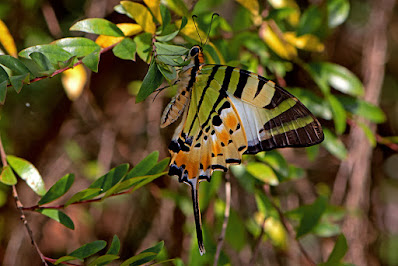 |
Ob Khan National Park, Chiang Mai, Thailand. 360m a.s.l. |
Habitat: Graphium antiphates is a forest dependent species and is found in primary rainforest and moist evergreen montane forest. They favour areas close to streams and rivers at moderate elevations but up to 2000m a.s.l. in certain locations.
Flight time: all year, depending on location. Wingspan: 60-75mm
Life History: egg 3 days instar 1 2-3 days instar 2 2-3 days instar 3 2-3 days instar 4 3 days instar 5 6-7 days pupa 11-13 days Total egg-adult 29-35 days. All times are approximate.
Larval Hosts: Artabotrys siamensis, Desmos chinensis, Desmos cochinchinensis, Desmos dunalii, Uvaria concava, Uvaria curtisii, Uvaria dulcis, Uvaria grandiflora, Uvaria macropoda, Uvaria microcarpa, Uvaria rufa, Uvaria siamensis (Annonaceae), Machilus odoratissimus (Lauraceae), Magnolia champaca, Magnolia doltsopa (Magnoliaceae).
Actual host plant used depends upon location and availabilty of plant species.
Adult Food Sources: Nectar - Phanera championii (Fabaceae), Lantana camara (Verbenaceae), Bidens alba, Mikania micrantha (Asteraceae), Zanthoxylum avicennae (Rutaceae). NOTE: there are likely to be other nectar sources that are not yet recorded. Other - mud puddling (like other Graphium species, G.antiphates males adopt a filter-feeding technique, sucking up water through their proboscis, pumping it out through the anus, and then re-imbibing it. This enables them to extract dissolved minerals and also prevents them from becoming dehydrated in the tropical heat).
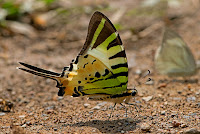 |
| Chiang Dao Nature Sanctuary, Chiang Mai, Thailand |
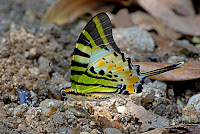 |
| Doi Suthep-Pui National Park, Chiang Mai, Thailand |
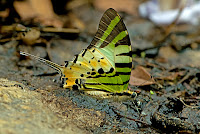 |
| Doi Suthep-Pui National Park, Chiang Mai, Thailand |
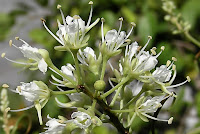 |
| Phanera championii, a nectar source |
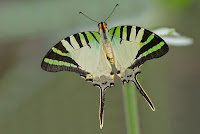 |
| Doi Suthep-Pui National Park, Chiang Mai, Thailand |
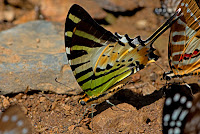 |
| Doi Suthep-Pui National Park, Chiang Mai, Thailand |
 |
| Doi Suthep-Pui National Park, Chiang Mai, Thailand |
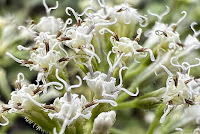 |
| Mikania micrantha, another nectar source |
%20gallery.jpg) |
| Doi Suthep-Pui National Park, Chiang Mai, Thailand |
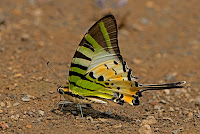 |
| Chiang Dao Nature Sanctuary, Chiang Mai, Thailand |
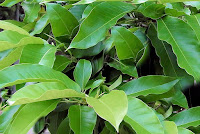 |
| Magnolia champaca, a larval host |
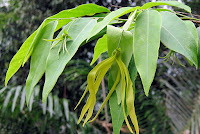 |
| Desmos chinensis, another larval host |
Links to other pages in this series for species in the same subfamily
Lamproptera meges
Papilio clytia
Papilio polytes
